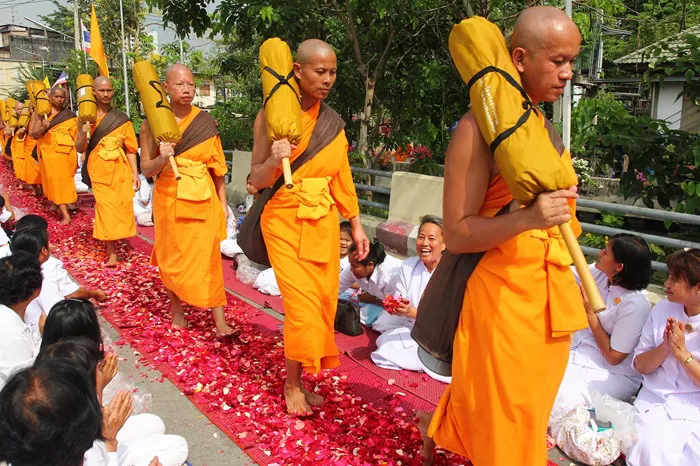Buddhist rituals are sacred practices that help followers express their devotion, cultivate mindfulness, and deepen their understanding of the Buddha’s teachings. These rituals vary across different Buddhist traditions but share common elements aimed at promoting spiritual growth and community harmony.
Core Buddhist Rituals
1. Prostration
Prostration is a physical act of reverence where practitioners bow down to the Buddha, the Dharma (teachings), and the Sangha (community). This gesture symbolizes humility and respect, helping to purify the mind and reduce ego. In Theravada Buddhism, the five-point prostration involves touching the forehead, palms, knees, and toes to the ground, demonstrating deep devotion and surrender.
2. Offerings (Pūjā)
Pūjā is a devotional ritual that includes making offerings such as incense, flowers, food, and light to the Buddha or bodhisattvas. These offerings represent gratitude and the impermanence of life. The act of giving is believed to accumulate merit, leading to spiritual progress and a better rebirth.
3. Chanting and Recitation
Chanting involves the repetitive recitation of sacred texts, mantras, or sutras. This practice helps to focus the mind, cultivate positive qualities, and internalize Buddhist teachings. Chanting is often performed in a group setting, accompanied by musical instruments like bells or drums, enhancing the communal experience.
4. Meditation
Meditation is central to Buddhist practice, aiming to develop mindfulness, concentration, and insight. Various forms of meditation include mindfulness meditation (Vipassana), loving-kindness meditation (Metta), and visualization practices. Meditation helps practitioners understand the nature of reality and attain inner peace.
5. Pilgrimage
Pilgrimage involves visiting sacred sites associated with the Buddha’s life, such as Lumbini (his birthplace) and Bodh Gaya (site of enlightenment). Pilgrimages are acts of devotion, offering opportunities for reflection and connection to the historical roots of Buddhism.
Rituals in Different Buddhist Traditions
Theravada Buddhism
In Theravada Buddhism, rituals emphasize personal effort and adherence to the teachings of the Buddha. Common practices include:
- Observance of Uposatha days: Regular days of intensified practice, including meditation and study.
- Offering food to monks: Laypeople provide alms to monks, supporting their monastic life and accumulating merit.
- Recitation of the Tripitaka: Chanting the Pali Canon to preserve and transmit the teachings.
Mahayana Buddhism
Mahayana Buddhism focuses on the Bodhisattva ideal, aspiring to attain Buddhahood for the benefit of all beings. Rituals include:
- Seven-part Pūjā: A liturgical sequence involving praise, offerings, confession, rejoicing, requests for teachings, entreaties for the Buddha’s presence, and dedication of merit.
- Vows and aspirations: Making resolutions to cultivate compassion and wisdom, often through the practice of the Six Perfections.
- Visualization practices: Imagining oneself as a Bodhisattva to develop altruistic qualities.
Tibetan Buddhism
Tibetan Buddhism incorporates elaborate rituals, including:
- Tantric practices: Rituals involving mantras, mudras, and mandalas to transform the practitioner’s mind.
- Guru devotion: Rituals honoring the spiritual teacher, believed to be essential for spiritual progress.
- Chöd practice: Rituals aimed at confronting and overcoming fear and ego by offering one’s body to spirits.
Special Buddhist Ceremonies
Weddings
Buddhist weddings are not considered sacramental but are important cultural and spiritual events. They often include:
- Offerings: Presenting gifts to the Buddha and monks.
- Chanting: Reciting blessings for the couple’s happiness and harmony.
- Water pouring ceremony: Symbolizing the couple’s commitment to each other and the community.
Funerals
Buddhist funeral rituals aim to guide the deceased’s consciousness and provide support for the grieving family. Practices include:
- Chanting: Reciting sutras to transfer merit to the deceased.
- Offerings: Providing food and incense to honor the departed.
- Memorial services: Holding ceremonies on specific days after death to ensure a favorable rebirth.
Festivals
Buddhist festivals celebrate significant events in the Buddha’s life and the lunar calendar. Notable festivals include:
- Vesak: Celebrating the Buddha’s birth, enlightenment, and death.
- Obon (Ullambana): Honoring deceased ancestors and guiding spirits.
- Losar: Tibetan New Year, marked by prayers and rituals for prosperity and well-being.
Conclusion
Buddhist rituals play a vital role in the spiritual life of practitioners, offering structured practices to express devotion, cultivate mindfulness, and foster community. While the specific rituals may vary across traditions, their underlying purpose remains consistent: to support individuals on their path toward enlightenment and to promote peace and harmony in the world.

